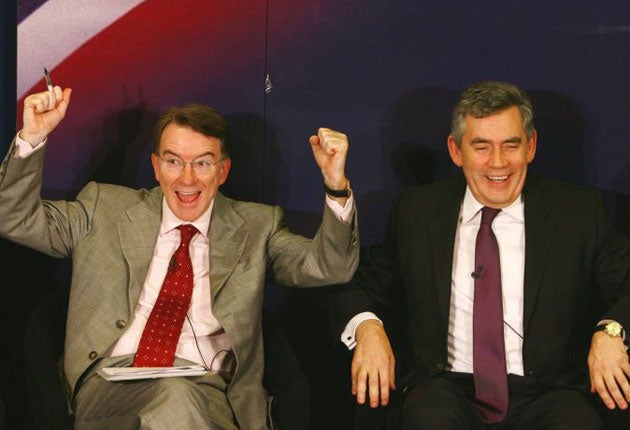Ups and downs of the Peter and Gordon show
An old friend who turned into a bitter foe has come to the PM's rescue, says Andrew Grice

It should have happened a long time ago," Gordon Brown told me recently about the ending of his long personal feud with Peter Mandelson and his return to the Cabinet. If it hadn't happened, it is unlikely the Prime Minister would still be in his job.
Lord Mandelson has appeared to keep Mr Brown's premiership afloat in recent days. Now, after last night's disastrous European election results, he may have to do it all over again.
The Business Secretary has oozed calm in a series of media interviews, despite the storm battering the Prime Minister. Crucially, he bolstered Mr Brown at the point of maximum danger – when James Purnell, the Blairite work and pensions secretary, resigned from the Cabinet just before the 10pm news bulletins last Thursday.
Lord Mandelson hit the phones to lock in key Cabinet ministers – most importantly, the Foreign Secretary David Miliband, a close friend of Mr Purnell. Mr Brown rang round the Cabinet. The joint offensive worked: Mr Purnell was acting alone, and the rest of the Cabinet stood firm. For Lord Mandelson to be the most important last man standing beside Mr Brown is a remarkable twist to a relationship which has gone from soulmates to enemies and back to friends.
Both men are hugely relieved that they have healed the rift, which dates back to Lord Mandelson's decision to back Tony Blair over Mr Brown – the senior partner in the modernising double act – for the Labour leadership when John Smith died in 1994.
Mr Brown felt betrayed. He believed Lord Mandelson had plotted behind his back. As the emails between the Business Secretary and his former aide, Derek Draper, that were leaked yesterday reminded us, Lord Mandelson agonised before backing Mr Blair as the man who would play better in Middle Britain. Mr Brown could not forgive Lord Mandelson. It was easier to blame him than Mr Blair, with whom he had to have a working relationship.
The Brownites cast Peter Mandelson into the wilderness. They were suspected of playing a part in his first resignation from the Cabinet in 1998, after the leaking of his £373,000 home loan from the Treasury Minister, Geoffrey Robinson. In turn, he could be scathing about Mr Brown. After quitting the Cabinet a second time, he became a European Commissioner because he thought he would have no future in domestic politics under Mr Brown. When Mr Brown became PM, Lord Mandelson delighted in announcing he would not seek a second term in Brussels.
Despite yesterday's headlines, the leaked messages between him and Mr Draper, dated January last year, suggested the bitterness was starting to wane. True, he described the Prime Minister as insecure and uncomfortable in his own skin. But the full emails show they were intended to be constructive. Lord Mandelson said: "A new public persona cannot be glued on to [Mr Brown]. It cannot be found; it has to emerge. It will do so from self-confidence ... when he is being successful and receiving approval. Then he will visibly relax. He will be enjoying himself. Not so angry."
The ice melted when Mr Brown went to Brussels soon afterwards. The routine meeting became a long one. After that, Lord Mandelson advised the Prime Minister on the telephone. That grew into secret meetings. The team was back together.
Others too: Alastair Campbell, Mr Blair's former communications director, and Lord (Philip) Gould, his pollster. When Mr Brown indulged in joshing about Lord Mandelson returning to British politics, he assumed the PM was joking. Last October, his return to the Business Department stunned Westminster.
It soon became clear Lord Mandelson was doing much more than presenting the Government's case in the face of the global recession. Mr Brown sought the strategic advice he had first given when he and Mr Blair were climbing the party ladder.
Lord Mandelson quickly became one of the Prime Minister's two most trusted advisers along with Ed Balls, the Schools Secretary, with whom he had patched-up a rocky relationship. It came under strain after it emerged an old Brown inner circle, led by Mr Balls, was holding separate meetings from a new circle led by Lord Mandelson. The sessions were merged.
Lord Mandelson is older and wiser now and relieved he does not have to operate in the shadows. The Prince of Darkness is now "prince of stability". In last Friday's reshuffle, he was promoted to First Secretary of State – Deputy Prime Minister in all but name (the title his grandfather Herbert Morrison held from 1945-51).
He also got an expanded Business Department. Some Labour MPs suspect Lord Mandelson is propping up Mr Brown partly out of guilt about the estrangement. Friends insist he is motivated by loyalty to the party and the New Labour project.
Lord Mandelson believes Mr Brown can weather the storm because Cabinet support is solid. That could change if enough Labour backbenchers call for the Prime Minister to quit.
Some Labour MPs believe there could yet be dramatic final chapter in the Brown-Mandelson relationship: if this final throw of the dice does not work, it might fall to Lord Mandelson to tell Mr Brown the game is up.
That really would be the end.
Subscribe to Independent Premium to bookmark this article
Want to bookmark your favourite articles and stories to read or reference later? Start your Independent Premium subscription today.

Join our commenting forum
Join thought-provoking conversations, follow other Independent readers and see their replies